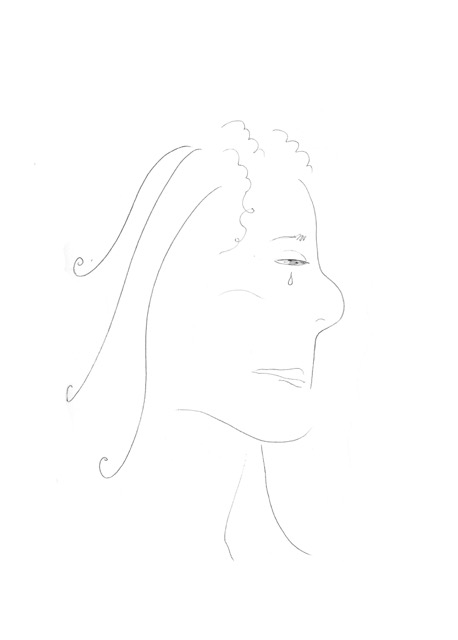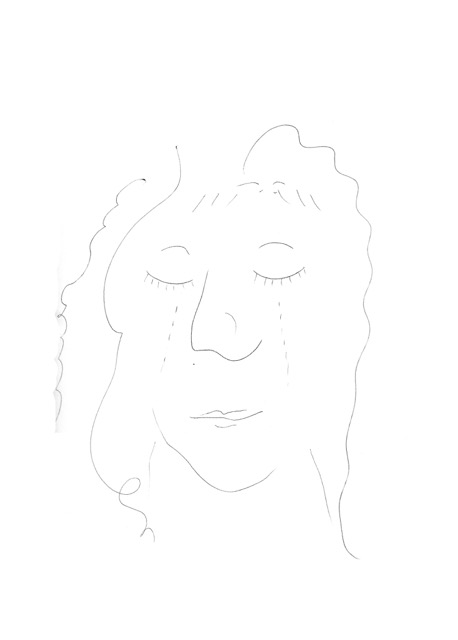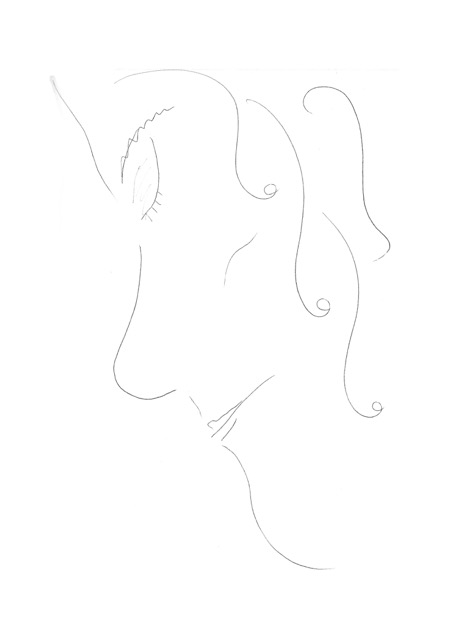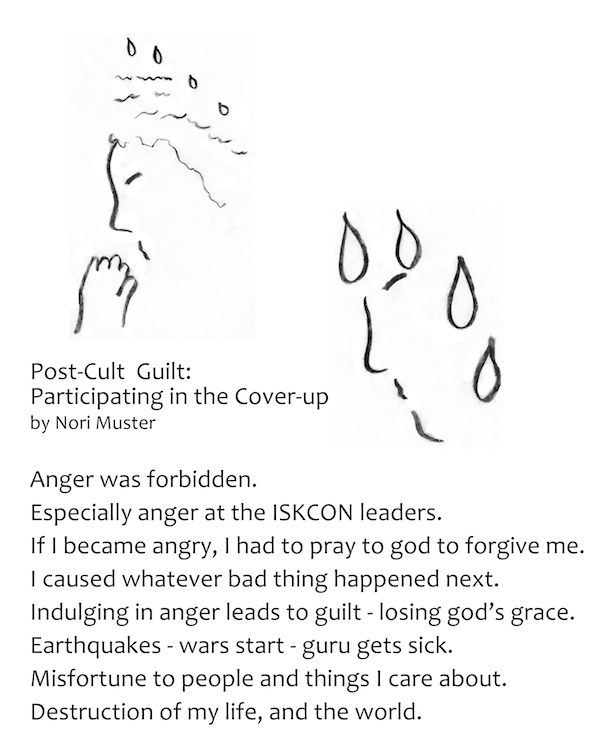

|
Post-Cult Guilt Artwork By Nori Muster October 31, 2015 Diana Pletts (head of the ICSA Phoenix art project) suggested I work on an art piece to go with my presentation in Dallas 2016 on post-cult guilt.* I thought about it for two months, then an image came to me this morning. Upon waking, the image included dread—my fear about the things that could happen to me because of my offenses to the gurus, and for covering up and lying for the organization. Early afternoon, when I drew the image, fear did not come out in it at all. Maybe it's because through counseling, I've learned to let go of the superstitious beliefs the cult planted in my thoughts. It's inappropriate to offend people or lie, but the consequences do not include creating problems outside my sphere of influence. For example, my mistakes cannot cause a friend to get in a car accident on the other side of town. Guilt and worry have other consequences, but it's not at all like the gurus told us. Only a child, or a naïve, psychotic, or brainwashed person attributes outside events to magical thinking. Because my guilt no longer includes dread, my drawings just convey sadness. I drew three versions of the image I saw in my mind, and each one seems less severe. 



Ex-member Guilt and the Path to Self-Forgiveness By Nori Muster Notes from a presentation at the ICSA Conference, Dallas, July 2, 2016 I grew up in Los Angeles, had a difficult adolescence, then went to college in Northern California. The day after college graduation June 19, 1978, I joined ISKCON (Hare Krishna), and moved into their temple in Los Angeles for ten years. After ISKCON I earned my master's degree in Oregon in 1992. During this time I was working on my memoir about ISKCON, Betrayal of the Spirit, and it was published in 1997. After that I got into real estate, and continue to write. To prepare for this presentation, I did a lot of research. I interviewed other ex-ISKCON members on whether they experienced group-related guilt. I read a book about guilt. I talked to my counselor about my guilt numerous times to resolve my own guilt. I also did extensive journaling to decide what I wanted to talk about. One thing I learned is that guilt masks pain. When I was studying the children of ISKCON, I would ask them if they ever told their parents about the abuse they endured in the ISKCON schools. The typical response was, "Every time I try to talk to my mother, she breaks down. She just says 'I'm sorry, I'm sorry,' and she is so stuck in her guilt I can't talk to her about it." This is an example of a situation where guilt is more tolerable than facing the pain behind the guilt. I also learned that guilt is the main game people play. Everyone is judging everything, deciding something is good or bad, and assigning guilt, or feeling guilt. One author calls this "the game of guilt." The ISKCON guilt I carried included: I learned to lie and became a thief like the organization's leaders. I became arrogant like the organization's leaders. A man I knew, Steven Bryant (Sulochan) was murdered. I didn't know the exact name of the man who shot him, but I knew ISKCON gurus conspired to commit the murder. Even knowing that much, I willingly covered up the organization's part in the murder. I got people to join ISKCON, including one mentally disturbed woman who ended up in an abusive marriage. I helped cover up for multiple crimes and abuses in the organization. I believed in the big lie, when I should have known better. Through my writing about the experience, I have washed away most of my guilt. Writing my memoir, plus my self-help book, and my book, Child of the Cult, are my way of making up for the harm I caused. Through my research and introspection, I believe I experienced two categories of guilt. On one hand, I feel an electrical shock in my heart when I think of things I did bad. This is a thinking habit, where I pine over small mistakes. For example, I got that person's name wrong (ouch), I didn't leave a big enough tip (ouch), I forgot to do something for somebody I promised (ouch), I was withdrawn when I needed to be more generous (ouch). We are all responsible for what goes on inside our own heads and hearts, so beating myself up over small mistakes is unnecessary. However, I learned to do this in the group, were they encouraged us to feel guilty. Getting followers to feel guilt works to the leaders' advantage because a guilty person is easier to manipulate. The other type of guilt is religious guilt, where God is watching all the time, taking note of our transgressions. The worst thing in our group was to express anger, especially toward the leadership. I tried as hard as I could to contain my anger, but occasionally would lose my temper. When this happened, I felt dread, because I knew God would punish me. Usually, whatever bad thing happened next was my fault for becoming angry. The leaders encouraged us to look within to see what we did wrong to cause external circumstances. This could be called superstitious thinking, magical thinking, childlike thinking, instant karma, or simply god's punishment. In ISKCON they called it, "Krishna smashing you." It's similar to the anti-woman philosophy, where in past centuries, women were called witches, and blamed for the plague, and other problems. When I interviewed other ex-ISKCON men, they could understand what I was talking about, but did not report experiencing it themselves. I believe this type of religious guilt was mostly experienced among women. One man suggested he sometimes feels guilty for contributing to world problems, such as having to fill his car with gasoline, and thus contributing to environmental problems. But the type of guilt I felt when Krishna smashed me, was my guilt caused wars, earthquakes, deaths, illness, and misfortune to myself or people I cared about. To get over guilt, I recommend talking about it with a qualified counselor or friend, write about it in a journal, do artwork to express and cleanse your guilt, and use rational thinking to change negative thinking habits. One rational thinking exercise my counselor recommended for me, was to ask myself, "Did this bad reaction happen because I was bad?" If so, that shows it's probably my triggers. Guilt is a habit, and it can be difficult to change a habit. The feeling of guilt is not just in your thoughts, but also in the body. If you have guilt, you might feel it as an electrical shock, a feeling of dread (expecting god's punishment), or as a feeling of depression and worthlessness. Guilt covers emotional pain, and may include psychosomatic physical pain. One last word about magical thinking. When I was preparing for this presentation, people asked me, what about when you're thinking of a song, and then it comes on the radio? What about when you're thinking of a friend, and then the friend unexpectedly calls you? What about when you wish for something, and it arrives at your door without asking? Or what about when you're feeling happy, and all of a sudden there's a big double rainbow? These types of incidents are called synchronicity, and are not related to guilt. These are serendipity, and make life fun. Because we live in a small world, synchronicities happen all the time. Synchronicities are like the background music of our lives, and it makes life more fun if you notice them. Synchronicities are so embedded in our culture, all of our stories—any story worth telling—has synchronicities. In a mystery, the detective must be at the right place at the right time to find the clue to solve the mystery. In a love story, the two people must meet, and it is often through a synchronicity. They bump into each other several times on the street, or they happen to be at the same place at the same time, where they meet. A hero must be at the right place and time to cross the threshold into the story. My advice is to find a peaceful place inside and nurture self-acceptance. If you feel guilt, find out what's behind it, and allow yourself to experience the pain, or whatever emotion the guilt is covering. It may be difficult, but that's an honest reckoning with what is true, and is the first step to letting go. If you have trouble letting go of guilt and pain, consider working on the Twelve Steps (on your own, or with a non-toxic group), or consult a licensed counselor. Related - a play that portrays religious guilt: The Sparrow, by Nathan Allen (2007). Related - a movie that portrays religious guilt: A Serious Man, by Ethan and Joel Coen (2009) Index |